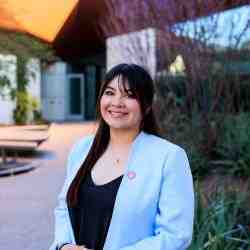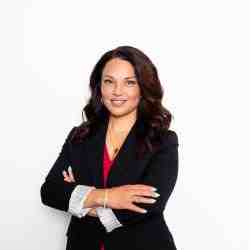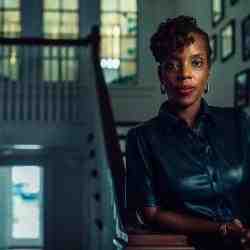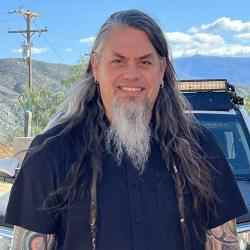Introduction
Luis Quintana is creating a culture of inclusion for persons with disabilities. He enables people with disabilities to use their consumer power to raise the bar for accessibility and inclusion, while working with businesses and the non-disabled to help them understand disability and facilitate inclusion in all social and work settings.
The New Idea
Todo Accesible is working to create a true culture of inclusion for persons with disabilities. Luis Quintana believes that physical access is a key to, but only the beginning of, a new culture of inclusion. He empowers people with disabilities to use their consumer power to raise the bar for accessibility and inclusion, while working with businesses to provide them with the tools to become truly inclusive. Luis’s solution addresses infrastructure challenges through physical improvements, and also addresses the need for social and cultural understanding and integration.
Starting with the space itself, Luis’s team consults on plans for new buildings and evaluates existing structures for their accessibility. The evaluations are conducted by a team of people with disabilities, in order to test not just legal conformity, but real access. Luis’s standards of accessibility go beyond just the physical nature of the building. In order to complete the intervention in a space with meaningful cultural change, Todo Accesible conducts sensitization workshops. These workshops are conducted by people with disability and are tailored to the individual needs of different types of businesses. The workshops are filmed, and management is trained to replicate them in response to any staff turnover. After this process, buildings which are truly accessible for all types of disability and whose staff have been trained through the workshops are recognized with Todo Accesible’s “Distinctive A,” an accessibility indicator that goes beyond the government standards and considers a myriad of types of disabilities. Luis’s website, Todo Accesible.com, provides a directory of the inclusivity of spaces across Mexico, ranging from corporations to bars and hotels. By providing ratings and commentary on a variety of spaces, the directory enables those with disabilities to use their consumer power to choose accessible spaces and generate change.
Luis’s goal is to create a Mexico where accessibility leads naturally to inclusion. His method identifies and aligns the incentives for all actors involved. Aside from benefitting persons with disabilities themselves, the workshops resolve uncertainties about the correct way to interact with the disabled, and they also help companies see the business and tax benefits of catering to differently-abled clientele. Luis works with employers to integrate hiring employees with disability into their normal employment cycles, and is well-positioned to respond to the landmark legislation which will in 2015 make accessibility a requirement for all businesses with over 50 employees. With the added pressure of the online directory and increased consumer conscience, Luis is working toward a culture where businesses that do not move to become inclusive will face social pressure to do so. Through all these efforts Luis is building a radical shift in Mexico’s culture of disability and access.
The Problem
In Mexico, despite slowly increasing legislative attention, the inclusion of disabled persons is rarely taken into consideration, especially in the urban landscape, the workplace and in spaces where social activities take place. 19% of Mexico’s population lives in a household where at least one member has a disability, yet 72% of Mexicans believe that the rights of the disabled are ‘scarcely’ or ‘not at all’ respected and only 30% of Mexicans say they would employ a person with a disability. All across Mexico, those with disabilities are excluded from participation based on the physical restrictions of the places in which they hope to work, live, commute or socialize. In Mexico City, for example, only six of the city’s 195 metro stations are fully equipped to accommodate the disabled. In many cases, the question of access to physical infrastructure prevents individuals from securing employment, as well as from participating meaningfully in the social fabric of the country. These barriers to access are relevant for a variety of differently-abled groups, including the blind, deaf, and mentally-disabled populations of Mexico.
The exclusion of the disabled is also culturally perpetuated. Little effort has been made from the general population to foster a culture of inclusion. When buildings are inaccessible, those with a disability are often left out - excluded from social situations, ineligible for jobs, or otherwise excluded from participating in many aspects of society. Social settings such as restaurants, hotels, and bars, do not have staff that are equipped to respond to accommodate guests with disabilities. Furthermore, disabilities, and the social exclusion associated, can put a strain on family and personal relationships, and have damaging consequences for mental health.
While many people would like to be more inclusive, the general consensus is that they are unsure of the correct way to accommodate persons with different disabilities. Ignorance can engender fear and discrimination: many would rather ignore someone with disabilities than risk interacting incorrectly with him or her. Especially in professional contexts, little attention is devoted to ensuring that staff and personnel know how to address the needs of persons with different types of disabilities.
On the whole, current efforts to address disability represent largely piece-meal solutions to surface level elements of the problem. Without a cultural shift on a broad level, society will continue to treat persons with disability as less-than-equal members of society, and exclude them from daily life.
The Strategy
Instead of thinking of each piece as a separate challenge, Luis has designed a strategy which sees physical space and culture as integrated components of the same vision of real inclusion, and for viewing accessibility as a consumer choice.
Working either from the ground up to collaborate with contractors as they design their first blueprints, or in modifying existing structures, Luis’s team pushes builders to think beyond simply handicap ramps. He first brings persons with a wide range of disabilities to assess a space’s accessibility, and then brings in his team of architects to ensure the changes are actually executed. Todo Accesible (meaning “All Accessible”) evaluates all types of businesses, from restaurants to office spaces, so that they can understand the needs of persons with diverse disabilities and make the changes necessary to really include them. Working with the architects also allows Luis to be flexible and creative in the approach, which views the challenge as problem-solving for inclusion, rather than accessibility audits.
As an example, Luis has recently worked to collaborate with the local government of the State of Morelos on the construction of the new soccer stadium, Estadio Augustin Coruco Diaz in Zacatepec. The stadium includes 78 seats for people in wheelchairs, a station for the guide dogs of blind attendees and floor markings that can be followed with a cane, visual alarms, instructions in sign language and braille, handicap accessible ticket booths, food stands and bathrooms, and a plan for special guides trained to assist any person in reaching their seats or other places within the stadium. It is the first handicap-accessible soccer stadium in Mexico, for attendees, staff and even players. In thinking about spaces, Luis’s team is always designing real solutions, rather than just complying with government standards. If, for example, it is impossible to make every floor of a building accessible, Luis works with its owners to rearrange the space’s use, so that common spaces like meeting rooms and libraries are on the accessible floors.
As important as the building’s skeleton, Luis believes, is the capacity and attitude of the people who work within it. No organization can receive the “Distinctive A” from Todo Accesible without completing sensitization workshops conducted by persons with disabilities to help employees understand the complex nature of disability. The workshops cater to each business individually, so that the staff can know how to interact with someone with any disability. For example, Luis has worked on training hospitality staff to correctly push a wheelchair, accommodate a seeing - eye dog, arrange utensils and plates for a blind person, simplify menus and translate them into braille. In office spaces, he works with all employees so that they can correctly interact with peers with any disability, increasing social inclusion. Todo Accesible also is working to link companies interested in hiring persons with disabilities with organizations specialized in work inclusion.
The sensitization workshops empower those without disability to contribute to the shift toward inclusion culture, while Luis’s directory at Todo Accesible.com empowers everyone to see their use of accessible spaces as a consumer choice capable of generating social change. The directory assists people in identifying which restaurants, bars, hotels, and other spaces are physically accessible and socially inclusive. Luis’s goal is to generate normative pressure, so that businesses and social settings begin to see inclusion as a necessary condition for their patronage.
Luis´s work comes at an inflection point for the country. A new Mexican law which will take effect in 2015 encourages inclusion of persons with disability in the workplace. If businesses of more than 50 employees hire as part of their staff at least 10% persons with disability, the company will receive income tax benefits. Luis has been strategic in identifying how he can take advantage of this moment in order to generate real mindset change. He believes that by beginning with intentional choices in a number of relevant sectors, and simultaneously bringing his perspective to the public through workshops and Todo Accesible’s directory, he is building a strong foundation to build and scale in order to bring about a culture of inclusion across Mexico.
Rather than try to reach a certain ‘critical mass’ of facilities, Luis has decided to identify the most visible leaders in each sector, working so that they will represent the vanguard and lead their industry toward accessibility and inclusion. He also focuses on work with global chains, in order to initiate a change that will extend beyond Mexico. So far, he has targeted the hospitality sector and others that involve one-on-one interactions, because he believes these are the fields in which personnel are most likely to meet someone with disabilities. Luis is also working with the government, because he believes that the institution initiating the much-needed legislation reforms for disability should be an example of accessibility and inclusivity.
Besides working with businesses, Luis is applying a number of other approaches to generating inclusive culture. Outside of the private sensitization workshops, he also hosts free workshops open to the general public. These workshops are all offered by persons with disabilities, giving positions of leadership to the very people that are usually followers. The workshops are designed around activities, rather than lectures, to have participants practice and become comfortable interacting with persons with disabilities.
Todo Accesible charges corporations for consultations, site visits, and workshops, based on the size of the project. Luis estimates that most of the companies he works with recover costs based on business generated by becoming handicap-accessible and through tax benefits. He chose to develop Todo Accesible as a social business because he believes that when people invest their resources in thinking about accessibility and inclusion, they are more likely to experience a lasting change in their approach to the issue.
In the two years that Todo Accesible has been operating, Luis has conducted 21 sensitization workshops, each of which trains up to 35 or 40 people, summing to more than 770 attendees. These workshops are recorded, and key staff are trained to replicate them in case of staff turnover. Todo Accessible has conducted assessments and consultations with more than twenty different establishments, and has plans for the coming year to work with Mexico´s biggest bank, a hotel chain, a university, and a number of different businesses. The Todo Accessible directory has already reviewed about 75 locations for accessibility.
In the next year, Luis is taking a number of concrete steps to scale his model. His goals for 2015 are to join a disability council to increase his expertise, to receive government backing for the Distinctive A certification, to expand to working with six more vanguard businesses, and to include an inclusive job-search mechanism on the website. Thinking about the future, he knows that in order to cover all of Mexico he will need to work closely with other organizations in the disability field so that the directory and certification can cover more ground, and he can reach more people through his sensitization workshops.
The Person
Luis Quintana has always had a passion for helping others, but until a car accident in 2005 left him severely paralyzed, he was unsure exactly how to make an impact. Before his accident, Luis studied at the Universidad Anahuac del Sur. He began by studying law, but soon realized that his skill sets and practical, creative approaches were especially well-suited for business. He finished a degree in business administration and began a successful career in purchasing, taking additional courses on the side to reinforce his business skills. But the 2005 car accident left him paralyzed from the waist down. After physical rehabilitation, Luis found that even though he maintained his high mental capacities, his employer, a large global chain, was unable to hire him back because their headquarters were not physically accessible for him.
Luis’s own experience opened his eyes to the gravity of the situation for persons with disability in Mexico. He was an educated businessman with years of experience, yet he lost his job because his multinational employer couldn’t accommodate his wheelchair: What did this mean for persons with other types of disabilities, or without his background and experience? Rather than just find a solution for himself, he decided to dedicate look for solutions that would affect the greater disabled population by finding ways to change Mexico’s approach to disability.
For Luis, the solution began by learning and thinking about ways to remove the barriers to physical access. His early interest in law proved useful as he learned the building codes and constitutional provisions that Mexico had already identified for accessibility. But as he adjusted to his own disability and learned more about the legislative framework, he realized a true solution would require a much more holistic approach than just making sure the legal standards for physical access were upheld. He found that overwhelmingly, even if their space was accessible, people were unsure how to appropriately relate to persons with disabilities, and that the challenges of disabilities go far beyond whether or not the building has a ramp for wheelchairs. Luis began to seek out individuals with other types of disabilities, asking the blind, deaf, and mentally disabled, whether the current system in Mexico worked for them, and about the nature of the barriers they themselves came up against. He found that physical accessibility for all required much more than the current government approach, and importantly, that cultural barriers play a huge role in impeding inclusiveness in Mexico.
Drawing on his conversations with the many stakeholders, Luis founded Todo Accesible in 2011 as an organization that could empower everyone from businesses to disabled persons themselves to cultivate a culture of inclusivity. Realizing that disabled persons have unique insights into true accessibility, he built a team of persons with a variety of disabilities to assess physical spaces and conduct the sensitization workshops. Luis has worked to generate a sustainable financing model for Todo Accesible and bring corporate incentives in accord with greater social inclusion. He is currently pursuing an online Master’s from a university in Spain, which focuses on universal accessibility and working to generate partnerships for Todo Accesible with other organizations across Mexico and globally.




